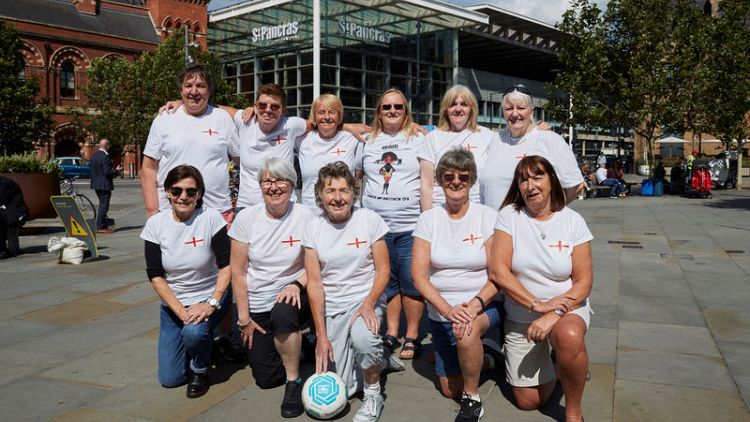By Simon Evans
LYON, France (Reuters) - As the United States and England did battle in their World Cup semi-final, in front of 55,000 fans at Olympique Lyon's stadium, there was the sensation that this was a breakthrough moment for women's football.
But for some in the crowd at Tuesday's game, it was more of a flashback moment, a reminder of when, 48 years ago, women's football appeared ready for take-off before being blocked by the conservative attitudes of the authorities.
The first "World Cup" for women, an unsanctioned event, was held in Mexico in 1971, drawing crowds over 90,000 to the Azteca Stadium.
The tournament was won by Denmark, who beat the hosts, after getting past Argentina in the semi-finals.
Yvonne Bradley was part of the English team in that tournament, a squad that has become known as the "Lost Lionesses" and as she watched the enthralling game, won by the Americans 2-1, her mind went back to when, for a few weeks, she too was an international footballer.
"It was lovely to watch it – we really wanted England to do well. Part of me thought, I wish I could have been down there, but we were just in the wrong time," she told Reuters.
1971 was certainly not a time that was ripe for women's football to take off in the way it is now doing.
The 14 women who made up the first Lionesses team were not given blanket media coverage and nor did they benefit, as the current team do, from the support and organisational back-up of the Football Association (FA).
Instead, when they returned to England, several of them were handed bans of three or six months and the man who had organised the team, Harry Batt, was banned for life from the game by the FA and the WFA (Women's Football Association).
"Harry was the one who had the vision," said Gill Sayell, who played in the team as a 14-year-old.
"(England) hadn’t got a team together but he had all the contacts and could make it happen. But on return he was banned. We think it put women’s football back quite a bit. It is only relatively recently that it has really taken off," she said.
PLAYING ON PARKS
Batt had named the team "the British Independents" but the local organisers of the event, sponsored by a drinks company, simply chose to call them "England" and that was enough for sanctions to be imposed.
"Quite a few of the girls gave up all together, because of the ban and because it just went flat really. We came home after all that excitement and there was nothing really," said Sayell, who herself played until she was 36.
An England side was set-up in 1972 but none of the "unofficial" team were included and they soon drifted apart.
It was only recently that the group were re-united and was then offered a trip to Lyon by UEFA's "We Play Strong" campaign, allowing them to get a taste of the World Cup and the modern game where women have a proper structure and organisational backing.
"We would have loved that, everyone of us would have relished the chance to go professional," said Bradley.
Once the bans were served, those women that did continue playing, for clubs such as Chiltern Valley Ladies, which had been formed by Batt, or other local league clubs, did so in environments far removed from the flashlights and noise of a World Cup.
"The noise in that stadium here (in Lyon) was absolutely fantastic and that is what we remember about the Azteca, it was deafening, it was just a surreal experience," said Sayell.
“But we went from playing on parks to playing at the Azteca Stadium and then back to playing on parks.
"We were away for a month and you thought ‘did that really happen’? I was 14, came back and it wasn’t even mentioned at school, it was like it never happened".
The first Lionesses could certainly be forgiven some resentment at their treatment yet there was not the slightest bitterness as they enjoyed their chance to watch Phil Neville's side on the big stage.
"It is wonderful, it is a totally different ball game now," said Arlene Rowe.
"That is just the way that it was for us".
(Reporting by Simon Evans; Editing by Alison Williams)
